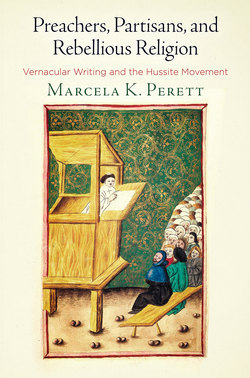Preachers, Partisans, and Rebellious Religion

Реклама. ООО «ЛитРес», ИНН: 7719571260.
Оглавление
Marcela K. Perett. Preachers, Partisans, and Rebellious Religion
Отрывок из книги
Preachers, Partisans, and Rebellious Religion
Ruth Mazo Karras, Series Editor
.....
As of 1410, Hus distanced himself from ecclesiastical authorities and began styling himself not so much their reformer but their alternative. One of the strategies that Hus employed to present himself as a reformed alternative to the corrupt authorities was to speak about the church as already divided, as composed of “us” and “them,” two camps, one containing himself and his followers, the other his opponents. To underscore the depth of the chasm, Hus equated his opponents with the party of Judas, explaining that, like Judas, they followed Christ solely for the sake of alms. Hus equated this with serving as priests for the sake of benefices and taking holy orders so as to have an easy life.60 The “us versus them” mentality is evident throughout these later sermons. In one example, Hus illustrated the division between the two parties by saying that, whereas Christ said, go preach God’s word, they (meaning Christ’s and, fittingly, Hus’s opponents) say do not preach, do not offer God’s word gratis. Whereas Christ said not to bring gold or silver with you, they say the opposite, and whereas Christ said, we do not want to be served, the corrupt clergy claim the opposite. At the end of the sermon, Hus appealed directly to his listeners: “let us not act like this [meaning like Christ’s and Hus’s opponents], but let us compare our lives with the life of Christ, so that with him we could enter the eternal kingdom.”61 In order to underscore the differences between the two camps, Hus described the pope and prelates as the enemies of God and the Scriptures. In a direct allusion to the papal ban on preaching, Hus argued that because the pope and prelates ignored God’s command that his word be preached in the whole world, they showed themselves as “enemies of the Scriptures … and false witnesses.” Such enemies of the Scriptures ought to be condemned, Hus insisted, by all who love God and also by God. Hus styled himself and his followers as the party of God, of the Scriptures and of such authorities as the apostles, and also Augustine, Gregory, Pope Leo, Bede, John Chrysostom, and Anacletus, with whom Hus agreed that “one should not obey [another man] in evil.”62
As a way of discovering who belonged to which party, Hus invited his faithful to test the lives of those around them. In one memorable sermon, he advised them: “When you see any Christian, immediately think whether his life agrees with the Scriptures. If you think that it does”—Hus here emphasized each person’s responsibility for his own discernment—“then he is a true Christian, if he does not act the way that Christ had ordered he is false.”63 This invitation illustrates Hus’s conviction about the importance of the Scriptures in the life of the laity. However, it is a deeply unsettling proposition. In effect, Hus gave the laity the license to judge the clergy’s spiritual mandate and to decide for themselves whether they would recognize (and obey) it or not.
.....